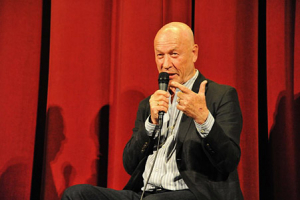Gallery
All Pictures (2)Biography
Joachim von Vietinghoff was born in Berlin on May 8, 1941. He comes from the Baltic line of the Westphalian aristocratic Vietinghoff family. From 1959 to 1960, he trained as a press photographer at the "Institut für Bildjournalismus" in Munich. He then worked as a photojournalist for the international press agency Keystone from 1961 to 1966 (during this period he did his military service in 1964/65).
After training and further education as a production manager (1966), Joachim von Vietinghoff entered the film business. In Munich, he gained practical experience as a recording and production manager on productions primarily by well-known directors of the New German Cinema. For example, Peter Fleischmann's "Jagdszenen aus Niederbayern" ("Hunting Scenes from Bavaria", 1969, as a prop master), Roland Klick's "Supermarkt" ("Supermarket", 1974), Vojtěch Jasný's "Ansichten eines Clowns" ("The Clown", 1975), Peter Lilienthal's "Es herrscht Ruhe im Land" ("Calm Prevails Over the Country", 1975), Bernhard Sinkel's "Lina Braake oder Die Interessen der Bank können nicht die Interessen sein, die Lina Braake hat" (1975), and Sinkel's and Alf Brustellin's "Berlinger" (1975) and "Der Mädchenkrieg" (1977).
After these formative years, and after making his first production credit on Roland Gall's "Wie ich ein Neger wurde" (1970, based on Ödön von Horváth's "Jugend ohne Gott") in 1969/70, Joachim von Vietinghoff began working as a producer in the mid-1970s. The first film produced by 'Von Vietinghoff Filmproduktion GmbH' (then still 'Von Vietinghoff & Nikos Perakis Filmproduktion') was Nikos Perakis's "Bomber und Paganini" (1976). The tragicomic crime caper starring Mario Adorf and Tilo Prückner became a classic of seventies German cinema.
A major success was "David" (1979) by Peter Lilienthal, the story of a rabbi's son who tries to leave Nazi Germany after his parents are deported. The film was awarded the Golden Bear at the Berlin IFF and the Filmband in Silber at the German Film Awards. In the following years, Vietinghoff produced Lilienthal's documentary Sandinista drama "Der Aufstand" ("'The Upridsing", 1980, Filmband in Silber), the milieu study "Dear Mr. Wonderful" (1982) set in New York with Joe Pesci as a worn-out Hollywood star, and the social drama "Das Autogramm" ("The Autograph", 1984) about the politics of oppression and resistance in Latin America; this film was also awarded the Filmband in Silber. Parallel films included Luc Bondy's family drama "Die Ortliebschen Frauen" (1980), which won a Filmband in Silber together with "Der Aufstand" and Thomas Brasch's "Engel aus Eisen" ("Angels of Iron", 1981), which was invited to the Cannes competition.
Other important productions and co-productions followed. For example, Helma Sanders-Brahms's love story "Laputa" (1986, Jury Prize at the Montreal World Film Festival), Jeanine Meerapfel's "Die Verliebten" (1987) and Thomas Brasch's "Der Passagier - Welcome to Germany" ("The Passenger - Welcome to Germany", DE/CH/GB 1988) with Tony Curtis as a Jewish director who makes a documentary about his concentration camp experiences and his forced participation in a Nazi propaganda film. Béla Tarr's poetic drama "Satanstango" (HU/DE/CH 1994), which is considered a milestone in the history of the Berlinale Forum, received particular attention. Tarr's "Die Werckmeisterschen Harmonien" ("Werckmeister Harmonies", HU/DE/FR 2000) also screened at the Berlinale Forum.
Vietinghoff also produced Dominik Graf's scathing satire "Doktor Knock" (DE/AT 1997), which won the Grimme-Preis, as well as Lars Kraume's feature-length debut "Dunckel" (1998) and his media satire "Viktor Vogel - Commercial Man" ("Advertising Rules!", 2001). Béla Tarr's Simenon adaptation "Der Mann aus London" ("The Man from London", FR/HU/DE 2007) premiered in competition at Cannes.
From 1983 to 2001 Joachim von Vietinghoff was a member of the advisory selection committee for the Berlin IFF competition. From 1995 he taught as a lecturer at various universities and institutes, including the German Film and Television Academy Berlin (dffb) and the Magdeburg-Stendal University of Applied Sciences. In 2001, the Deutsche Kinemathek Berlin dedicated the exhibition "Bilder, Stories, Filme: der Produzent Joachim von Vietinghoff" to him, which was accompanied by an extensive retrospective of his films. In the same year, he was honored with the Federal Cross of Merit 1st Class. In 2010, he was appointed to the board of the Deutsche Filmakademie for four years.
Vietinghoff appeared less frequently as a producer from the 2010s. The "Tatort" entry "Mauerpark" (2011, directed by Heiko Schier), Oliver Ziegenbalg's "Russendisko" ("Russian Disco", 2012) and Annekatrin Hendel's documentary "Familie Brasch" (2018) are among his most prominent productions of this era.
In 2012, he founded the company 'Schätze des Deutschen Films GmbH' with Hans W. Geißendörfer and media entrepreneur Andreas Vogel, which offers German feature films and documentaries on the VoD platform alleskino.de. In 2014, he launched the event format 'Kino trifft Kunst X Kunst trifft Kino', which made guest appearances at the Neo Rauch Aschersleben Graphic Arts Foundation, among others, in 2017. Vietinghoff has also been active as a curator time and again, for example in 2019 with the film series "Ihr Völker der Welt, schaut auf diese Stadt", in which six films were shown at five historically significant locations on the occasion of the 30th anniversary of the fall of the Berlin Wall.
